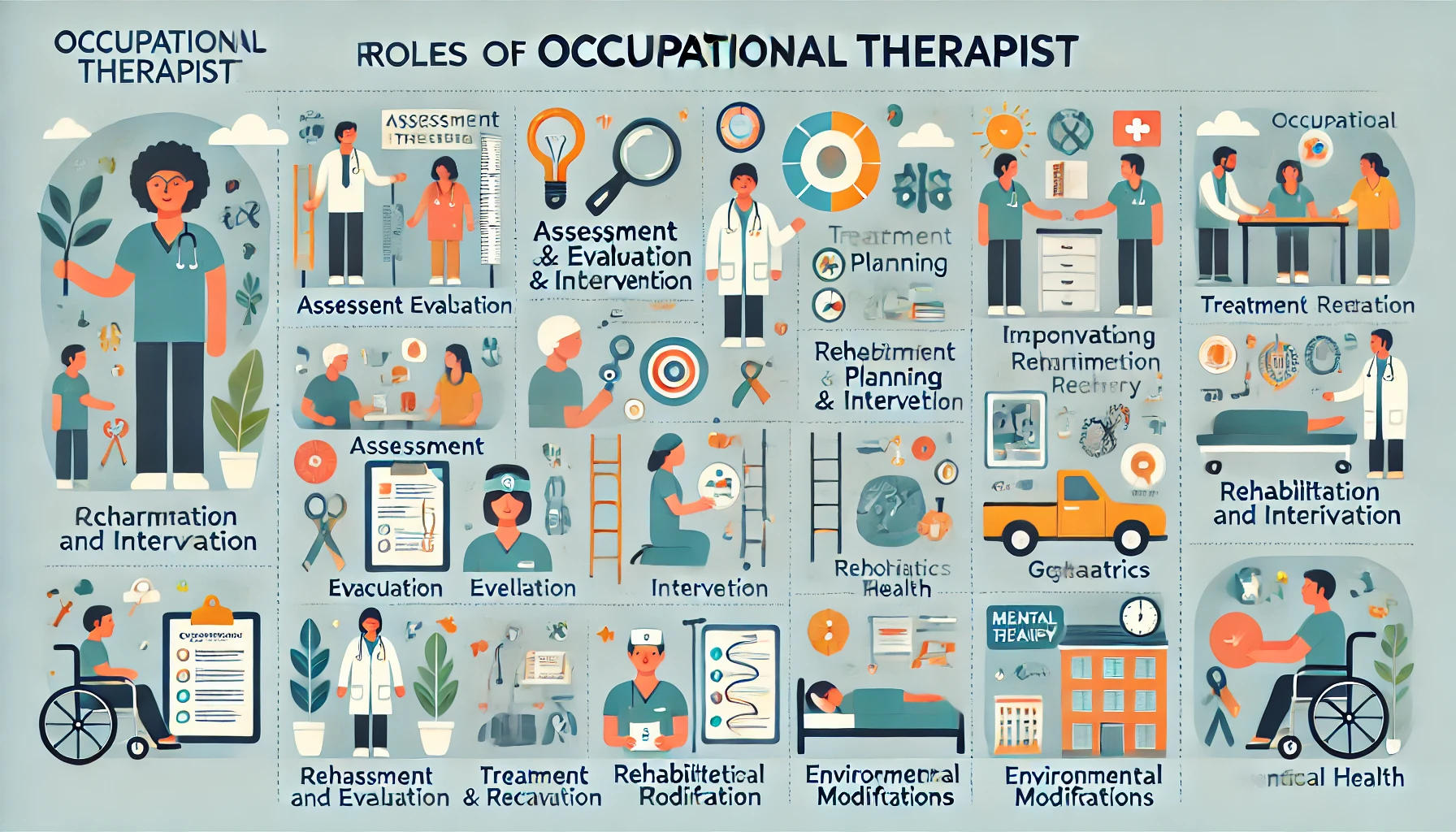What Do Occupational Therapists Do? A Comprehensive Overview
Occupational therapy (OT) is a vital healthcare profession that focuses on helping individuals achieve independence and improve their quality of life through meaningful activities. Occupational therapists (OTs) work with people of all ages and backgrounds, providing support and strategies to help them overcome challenges in daily living and enhance their overall well-being. This post explores the roles and responsibilities of occupational therapists, the various settings in which they work, and the impact they have on their clients’ lives.
1. Understanding Occupational Therapy
Occupational therapy is based on the premise that engaging in meaningful activities—referred to as “occupations”—is essential for physical, mental, and emotional well-being. These occupations can range from daily self-care tasks to social participation and work-related activities. OTs assess clients’ needs and create individualized treatment plans to help them achieve their goals.
Key Principles of Occupational Therapy
- Client-Centered Approach: OTs prioritize the needs, preferences, and goals of their clients, ensuring that treatment is tailored to each individual.
- Holistic Perspective: Occupational therapy considers the whole person, including physical, emotional, social, and environmental factors that impact an individual’s ability to perform daily activities.
- Focus on Functionality: The primary goal of OT is to enhance functional abilities, enabling individuals to participate in everyday life activities effectively.
2. Roles and Responsibilities of Occupational Therapists
Occupational therapists engage in a variety of activities to support their clients’ needs. Here are some of their key responsibilities:
Assessment and Evaluation
- Initial Assessment: OTs begin by conducting a comprehensive assessment to evaluate a client’s abilities, challenges, and needs. This may include standardized assessments, interviews, and observations of daily activities.
- Goal Setting: Based on the assessment results, OTs collaborate with clients to establish realistic and achievable goals for therapy.
Treatment Planning and Intervention
- Individualized Treatment Plans: OTs develop customized intervention plans that outline specific strategies and activities to help clients achieve their goals.
- Therapeutic Activities: Interventions may involve practicing daily living skills, adapting environments, or implementing assistive technologies to enhance functionality.
- Education and Training: OTs educate clients and their families about techniques, tools, and strategies to promote independence in daily activities.
Rehabilitation and Recovery
- Post-Injury or Illness Rehabilitation: OTs assist clients recovering from injuries, surgeries, or illnesses to regain their independence and functional abilities.
- Chronic Condition Management: OTs work with individuals managing chronic conditions (e.g., arthritis, stroke) to develop strategies for coping and enhancing their quality of life.
Home and Workplace Modifications
- Environmental Adaptations: OTs assess living and working environments to identify barriers to independence. They recommend modifications, such as grab bars in bathrooms or ergonomic furniture in offices, to enhance safety and accessibility.
- Assistive Technology: OTs may recommend and train clients in using assistive devices, such as wheelchairs, adaptive utensils, or communication aids.
3. Areas of Specialization
Occupational therapists can specialize in various areas, tailoring their practice to meet specific client needs. Some common specializations include:
Pediatrics
- OTs working with children focus on developmental delays, sensory processing issues, and learning disabilities. They support children in developing skills for play, school, and daily activities.
Geriatrics
- Geriatric occupational therapists assist older adults in maintaining independence and managing age-related conditions, such as dementia or mobility challenges.
Mental Health
- OTs in mental health work with individuals experiencing mental health conditions, providing strategies to improve emotional well-being and enhance daily functioning.
Hand Therapy
- Hand therapists specialize in rehabilitation for hand and upper extremity injuries, helping clients regain strength, mobility, and function after injuries or surgeries.
Rehabilitation and Pain Management
- OTs in rehabilitation settings support individuals recovering from surgery, trauma, or chronic pain, focusing on pain management and functional recovery.
4. Work Settings for Occupational Therapists
Occupational therapists can work in a variety of settings, including:
Hospitals
- OTs in hospitals provide acute care services, assisting patients recovering from surgery, trauma, or illness.
Rehabilitation Centers
- Rehabilitation facilities focus on helping individuals regain independence after injury or illness, with OTs playing a critical role in recovery.
Schools
- School-based OTs work with students to address developmental challenges, promote participation in educational activities, and support special education needs.
Home Health Care
- OTs providing home health services assess clients in their living environments, recommending modifications and providing therapy directly in the home.
Community Programs
- OTs may work in community settings, offering programs that promote health and well-being, such as wellness workshops or occupational skills training.
5. The Impact of Occupational Therapy
The work of occupational therapists has a profound impact on individuals, families, and communities. Some key benefits of occupational therapy include:
Improved Quality of Life
- OTs help clients regain independence, allowing them to participate in meaningful activities and improve their overall quality of life.
Enhanced Functional Abilities
- By addressing challenges and developing strategies, OTs empower clients to enhance their functional abilities and achieve their personal goals.
Support for Families
- Occupational therapists not only work with clients but also provide education and support to families, helping them understand the challenges and solutions related to their loved one’s care.
Community Engagement
- OTs play a role in promoting community health and engagement, working to ensure that individuals have access to the resources and support they need to thrive.
Conclusion
Occupational therapists are essential healthcare professionals dedicated to helping individuals achieve independence and improve their quality of life through meaningful activities. Their diverse roles, from assessment and treatment planning to rehabilitation and community support, highlight the importance of occupational therapy in promoting functional abilities and well-being. By understanding what occupational therapists do, individuals can better appreciate the impact of this profession and the invaluable services they provide to enhance the lives of those they serve. Whether in hospitals, schools, or community settings, occupational therapists are committed to making a positive difference in the lives of individuals and their families.






